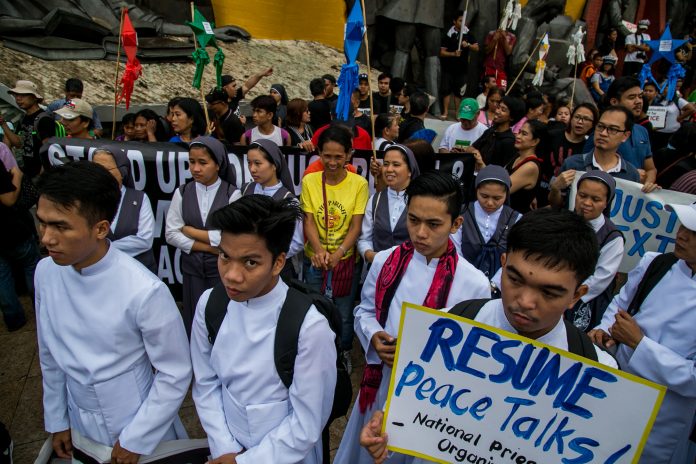The recent call by various Church groups for the armed conflict in the Philippine countryside to be settled at the negotiating table rather than in the battlefield is a timely and appropriate step in the right direction.
It is entirely correct for the Church groups to address their plea to both sides: to the government, and to the National Democratic Front (NDF) that is the political arm of the Communist Party of the Philippines (CPP) and its armed component, the New People’s Army (NPA).
But we think the call should be replicated by other sectors, namely business, labor, farmers, women, indigenous people, academe, the international community, among others, to have any real impact.
Otherwise, it becomes just a cry in the wilderness and ultimately, a wasted effort.
The Church plea takes added urgency as it comes close on the heels of the killing of NDF peace panel consultant and peasant leader Randall Echanis in Quezon City under mysterious circumstances.
The government has denied any involvement in this latest incident. But the Left believes that this is a covert operation of State security forces intended to send a strong message to the rebel side, particularly the leadership, that their days are numbered.
The Left is convinced that the Duterte administration has just upped the ante on its resolve to decimate its leadership and leave the rank-and-file no recourse but to give up the armed struggle, surrender their firearms to authorities and return to the fold of the law.
The killing of Echanis appears to be the second such cloak-and-dagger operation, eerily similar to what happened to another leading Left personality, Julius Giron, who was gunned down recently in Baguio City by unidentified gunmen who barged into his safehouse and also killed a female doctor who was attending to his frail medical condition.
It’s no secret that the Duterte government wants to put an end to the communist insurgency that has raged in the countryside for more than half a century before its term in office ends in mid-2022.
While Duterte showed willingness early on to talk peace with the Left, even appointing some of them to Cabinet posts, the honeymoon did not last long since the peace negotiations held in the Netherlands were not accompanied by a bilateral ceasefire that would have demonstrated good faith and mutual trust and confidence.
In the end, the peace talks had to be scuttled as armed hostilities flared up in various areas, leading to casualties on both sides and mutual distrust making it impossible for the negotiators to make any real progress.
The government is now trying to broker localized peace talks in areas where the NPA operates. But whether this is succeeding at all is debatable. The AFP claims there are a number of NPA rebels who have surrendered their firearms and have been given livelihood assistance so they can start a new life. The NPA, on the other hand, claims this is all propaganda and all their units are intact and follow orders only from the central leadership.
The military under the Duterte administration wants to capitalize on its numerical superiority and advanced weaponry to run the NPA to the ground. But military might alone has not succeeded in defeating the communist insurgency in more than 50 years. After all, it would take more than the force of arms to defeat a rebellion that seeks to end exploitation and oppression by the ruling classes and systemic corruption that has kept many Filipinos mired in poverty as the benefits of economic growth fail to trickle down to the grassroots.
The NPA, according to the military, has been reduced to as few as 3,000-4000 guerrillas operating from a vastly reduced territory from its heyday in the 1980s. But the rebels can still recruit new members from poor peasants and indigenous peoples in the countryside as well as idealistic youth from schools and universities in the urban areas and thus are able to replenish their forces.
In other words, while the rebels cannot be easily defeated by superior numbers and sophisticated weaponry, they can wage asymmetrical warfare that can wear down the military through guerrilla tactics over time.
Here we have a stalemate situation where neither side can possibly win over the other in the battlefield. This is an unwinnable war as both sides will inevitably suffer casualties, with civilians caught in the crossfire as collateral damage. Disruptions in economic activity due to war would also perpetuate rural poverty in the long run.
It is in the common interest of the government and the NDF to sit down and restart the peace talks where the necessary economic, social and political reforms can be discussed at length in an atmosphere of mutual trust. The alternative is a prolonged war of attrition that can only divide the people, cause more loss of human lives and bring about an uncertain future for the nation as a whole.
Ernesto M. Hilario writes on political and social justice issues for various publications in the Philippines. The views and opinions expressed in this article are those of the author and do not necessarily reflect the official editorial position of LiCAS.news.









